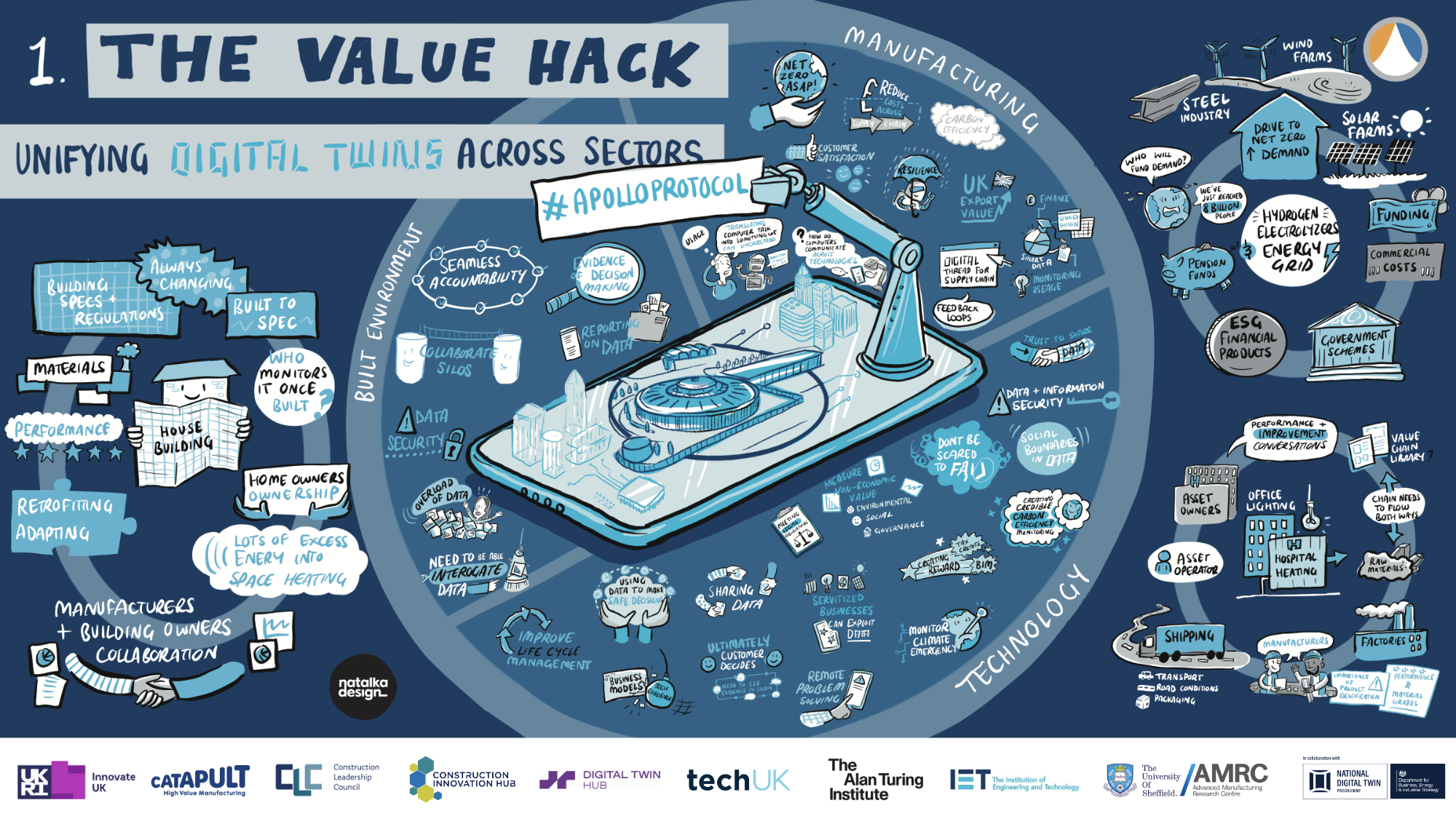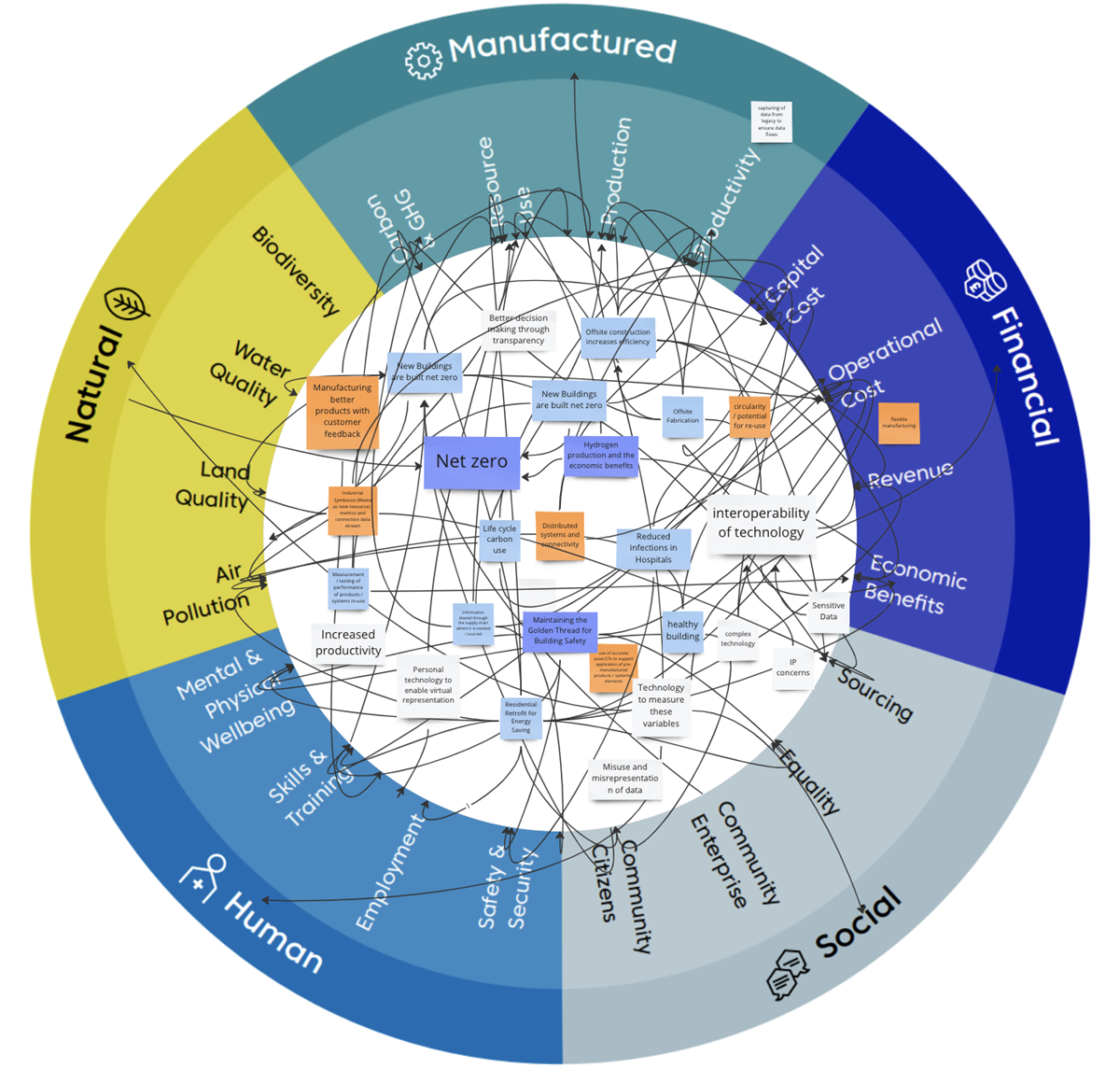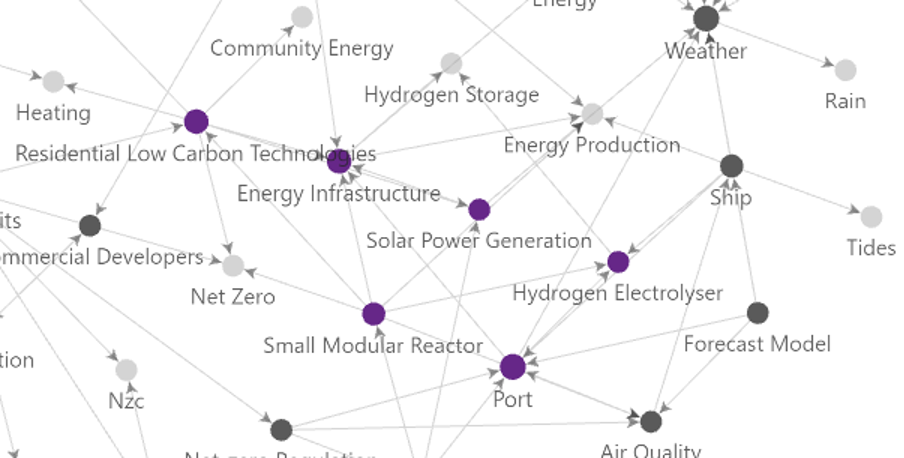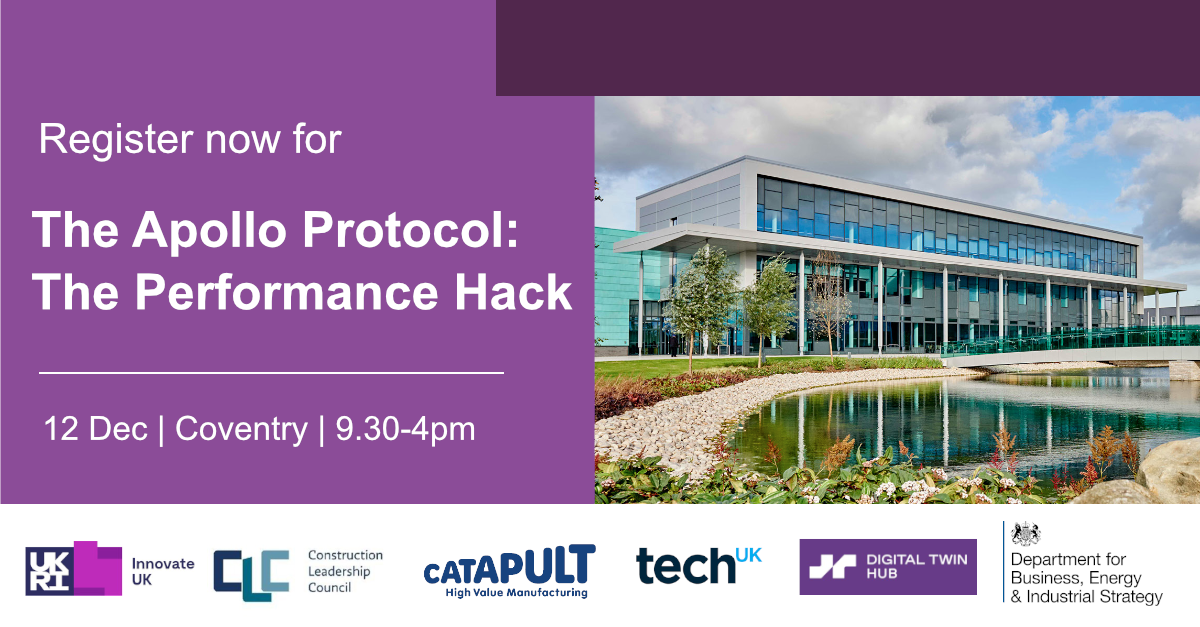Here’s a summary of some of the outcomes of our first Apollo Protocol Hack and information about how you can join the next one.

Why are we talking about Value?
Aligning the Value Chain is the first theme that The Apollo Forum discussed. All our activities as professionals are linked to the value we place in them, and to create any change in our activities we must address value as a core factor.
Companies provide value that is seen in discrete parts and locked-up between processes. However, reducing the scope of value into these small segments inhibits our ability to articulate value generated across organisations and supply chains.
In The Apollo Protocol White Paper, we set out the challenge of identifying a single value chain of data and information management. Both manufacturing and the built environment operate within complex supply chains which make creating connections difficult. However, we will only unlock the unexplored potential by coming together. We want to understand the interfaces between the built environment and manufacturing so that we can identify data streams that should exist between them.
Manufacturers and built environment practitioners approach value differently. In manufacturing, product development creates value by maximising efficiency of production, and logistics and operations create value to the delivery of products and services. There is rarely a value connection beyond into the built environment, once products are sold.
Meanwhile, built environment professionals operate in long, complex supply chains where value has different meanings at different times. Built assets have long lives, and to realise a connected value chain the built environment sector needs to ensure that data is relevant and robust throughout its lifecycle.
Together with our tech sector supporters, we explored the notion of value using a value profile from the Value Toolkit. This defines value in five different types – natural, manufactured, financial, human and social. The exercise enabled us to consider what priorities we had for value, based on how we perceived value passing through the supply chain. It also encouraged us to identify problem spaces and use cases for digital twins. What challenges were we facing for data sharing and information management? Where might opportunities lie?

We were surprised at how quickly the discussion of value moved to discussions of sustainability and the circular economy. Whilst financial value will always be important, other aspects need to be considered.
As we begin to identify problem spaces for sharing data between the built environment and manufacturing sectors, we have begun to map these out using a bespoke tool developed by the Apollo Forum team at the AMRC. Mapping out the interfaces between entities led us to a major conclusion:
Value is a Network
In the complex interconnected world we operate, the single value chains we commonly identify are not enough. Achieving a true articulation of unified value is ambitious, and to do it we need to transition from linear production and consumption to a circular network driven approach, as a shift from value chain to value network. Value is a network of interconnected opportunities between many entities to many others. Our first pass of a network takes the form of a Value Knowledge Graph. Here’s a snapshot of a section of it:

What we are creating is an articulation of a connected network of value chains. The Value Knowledge Graph is an evolving, working document of potential opportunities for cross sector value chains of digital twins. It currently consists of different types of entities; obvious ‘things’ such as ‘heat pump’, types of data sources and activities, and influences such as policy, standards or quality control.
Data is the lifeblood of connected decision making. Data is an asset with value that we need to understand to exploit it. As data is connected, value is connected.
We’ll be evolving and using the Value Knowledge Graph throughout the work of the Forum, as a tool to identify all sorts of existing and potential use cases and projects for digital twins between our sectors.
Use Case Examples
During the session our subgroups discussed several sources for use cases, from the steel industry to the energy grid, asset management examples and the residential sector. Over our two (offline and online) hack sessions we have also had groups explore interoperability and data sharing challenges, and begun to look at some of the other themes (such as circularity) we’ll be covering in our future hack sessions.
One of the rich veins of use cases will be the residential sector, which encompasses housebuilding, homeownership, asset management, tenancy and residential retrofit. We’ll be exploring these use cases and others in the coming weeks at our future hacks. By discussing them across sectors, we are learning about our colleagues' needs and getting their insights, which can often be quite perceptive.
‘It seems like the built environment sector is still at the very early stages of their data journey. If you buy a new house, for example, there is no simple way to identify whether it performs to the standards it was sold as having met. When you buy a freezer and it doesn’t work, you can send it back. There is no way of giving back a house and getting your money back’.
– attendee from the technology sector
Hopes and Fears
We can’t underestimate the challenge of the task we’ve got before us, but the opportunities are huge. A common perception of digital twins is that they are big and complicated, but they aren’t; you can start anywhere with a simple process or value proposition and build out as necessary.
During the sessions we articulated our hopes and fears. One recurring theme was that data sharing will be a huge challenge. Organisations are reluctant to share data, for a number of reasons. Here are some we have already identified:
- A general cultural reluctance to change ways of working.
- A lack of understanding of what can be done safely and without interfering with intellectual property rights.
- A sense that organisations will relinquish control by sharing data
- A concern for short term negative headlines compared with long term massive impact.
- Some companies make money from inefficiencies.
What value do we place on sharing data? How can we incentivise it? What is the business case?
On the positive side, the sessions have been full of hope and enthusiasm. Here are some examples:
- We can move away from the Open vs Closed approach to different levels of security that are fit for purpose.
- Learning from other sectors, understanding and identifying bottlenecks.
- Increasing the resiliency of the supply chain.
- Asset owners will stand up and ensure value is delivered on assets they acquire.
- We stop wasting time, money, resource, energy, moving to value generation instead.
Join the Apollo Forum Hacks

Our next hack will be looking at Performance. If you are involved in defining, monitoring or specifying performance in the built environment or manufacturing, or if you’re working in digital twins and performance is part of your remit, or if you enjoyed the last hack and want to come again, we’d love you to join us at these free, interactive events.
Register Now!
In person:
The Performance Hack at the AMTC Coventry 12 December 2022
On Zoom:
The Performance Hack Online 1-4pm 15 December
About the Apollo Protocol
The Apollo Protocol is an initiative to unlock the benefits of digital twins between the built environment and manufacturing sectors, supported by the technology sector.
Read more in our white paper The Apollo Protocol: unifying digital twins across sectors
The initiative is supported by:
- The Department for Business, Energy and Industrial Strategy (BEIS)
- Innovate UK
- The Institute of Engineering and Technology (IET),
- The Construction Leadership Council (CLC),
- The University of Sheffield Advanced Manufacturing Research Centre (AMRC),
- The High Value Manufacturing (HVM) Catapult,
- The Construction Innovation Hub,
- The Digital Twin Hub,
- techUK and
- the Alan Turing Institute.